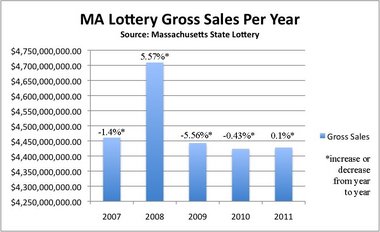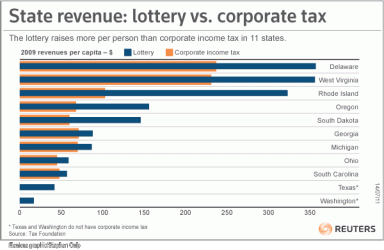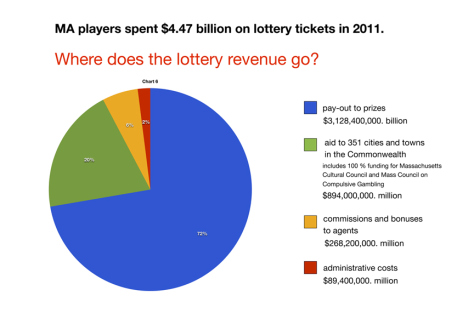The frenzy around the recent $636 million MegaMillions drawing takes attention from the two underlying government problems involve how the lottery monies are used. And winning won’t solve all your problems, either.
Americans are conflicted about wealth. One the one hand, most of us dream of being wealthy. On the other hand, we are suspicious of the wealthy and their influence on our lives. A prime example of this is all the interest when potential national and state lotteries jackpots reach record levels, like the recent MegaMillions $636 million jackpot. Now I knew I had the same probability of winning as I do canoodling with Eliza Dushku, but I bought one ticket anyway. There were two winners, one in Georgia and one in California, who beat the odds.
The Massachusetts Lottery Commission published the odds on winning MegaMillionsl:
The Massachusetts Lottery Commission published the odds on winning MegaMillionsl:
Match + Megaball Probability Top Prize
5 + 1 1 in 258,890,850 - JACKPOT
5 1 in 18,492,204 – $1,000,000
4 + 1 1 in 739,688 – $5,000
4 1 in 52,835 – $500
3 + 1 1 in 10,720 – $50
2 + 1 1 in 766 -$5
3 1 in 473 -$5
1 + 1 1 in 56 – $2
0 + 1 1 in 21 – $1
* Overall odds are 1 in 14.71
* Prizes based on a $1 wager.
5 + 1 1 in 258,890,850 - JACKPOT
5 1 in 18,492,204 – $1,000,000
4 + 1 1 in 739,688 – $5,000
4 1 in 52,835 – $500
3 + 1 1 in 10,720 – $50
2 + 1 1 in 766 -$5
3 1 in 473 -$5
1 + 1 1 in 56 – $2
0 + 1 1 in 21 – $1
* Overall odds are 1 in 14.71
* Prizes based on a $1 wager.
We all dream what we could do with all this sudden wealth and it is all about our own affluenza: move to a wealthy neighborhood, buy a big house, join elite clubs, all the things we despise in how the 1% live. Winning the lottery is our bubbling crude.
But it’s not the necessarily the path to “the good life” that we think. My aunt won the early version of the Massachusetts lottery twice, when they were in the 50′s. She and my uncle were well enough off before winning, but not wealthy. They were advised to quit work by their financial adviser because of the tax implications, and other than travel, they hadn’t really developed any other outlets for their energy and time. What they didn’t expect was the barrage of intrusion they would receive. Their phone rang 24 hours per day, even after having their number changed and unlisted frequently. People they didn’t know would knock on their door telling their hard luck stories and ask for money. Charities of all types and sizes asked for donations. These quiet, keep-to-themselves middle aged people died soon after. Their experience was not unusual.
There is the example of Sharon Tirabassi, a 35 year-old resident of Hamilton, Ontario
It happened to Sharon Tirabassi, a 35 year-old resident of Hamilton, Ontario. Nine years ago, The Hamilton Spectator reports, Tirabassi cashed a check from the Ontario Lottery and Gaming Corp. for $10,569,00.10 (Canadian). Today, after spending almost all her winnings — “big house, fancy cars, designer clothes, lavish parties exotic trips, handouts to family, loans to friends” — she’s back in the working class: riding the bus, working part-time, living in a rented house.What remains of her windfall is in trust for her six children; the money will become available when they turn 26.“The moment I got it, I divided it among my family,” Tirabassi told The Spec: $1 million to her parents, and $1.75 million among her four siblings. She was generous with others, too, buying houses and renting them out at low rates, paying people’s rent, offering loans for bail and business ventures.“All of that other stuff was fun in the beginning, now it’s like … back to life.”That other stuff included vacations in Cancun, Florida, Las Vegas, California, and the Caribbean, as well as four cars: a Hummer, a Mustang, a Dodge Charger and a custom Cadillac Escalade.Tirabassi was a single mother, recently off welfare and newly employed as a personal care provider, when she struck it rich on Easter Weekend in 2004. As a teenager, she had lived in shelters, and all that money didn’t come with instructions. Tirabassi didn’t hire a financial adviser; she didn’t even keep close track of her account balance. Suddenly, with just $750,000 left, Tirabassi woke up: “that was just time for fun to stop and to just go back to life.”Tirabassi’s husband, Vinny, who brought three kids of his own to the marriage, shares her stoicism about the couple’s lost fortune. He says he lived simply his whole life and is used to not being rich. Recalling the post-winning entreaties of suddenly interested friends, some of whom came asking for favors and then disappeared, Vinny says, “Money doesn’t buy you happiness. It caused her a lot of headaches.” His wife had a hard time saying no to those she thought of as in need: “That’s the way I was brought up,” she says. “Help those who can’t help themselves.”
But the saddest lottery winner story of all was that of Jack Whittaker from West Virginia.
Jack opted to take his prize as a one-time payout of $113,386,407.77, after taxes. He was determined, he said at the time, to live as if nothing had changed, except that he could spend more time with his family. He was going to keep answering his own phone, opening his own front door and turning to God for guidance. “He’s still working on me,” Jack said, sounding modest.On New Year’s Eve 2002, West Virginia’s most famous do-gooder strolled into the Pink Pony, a strip club in the nearby town of Cross Lanes, and, according to the manager, slapped $50,000 on the bar…..Most everybody in West Virginia had an opinion on how Jack should spend his fortune: Fix potholes; put a new roof on the library; spay cats and dogs; buy a coloring book for every kid…..Even from the start, there was something not quite right about the money. “I’ve had to work for everything in my life,” he reflected. “This is the first thing that’s ever been given to me.”Whittaker gave tens of millions to charity, even setting up a foundation to provide food and clothing for the needy of West Virginia. A dedicated Christian, he also donated a portion of his winnings to the church. Less than a year later, however, things began to turn sour for the man with too much money. In August 2003, during a visit to a strip joint called the Pink Pony, he was robbed more than $500,000 in cash and cashier’s checks, the money and checks stolen from his Hummer parked outside. Several months later, he was arrested after driving his Hummer into a concrete median, the arresting officer claiming that he smelled alcohol on Whittaker’s breath.No matter how much he tried to enjoy his enormous wealth, Whittaker couldn’t help but attract bad luck. More of his money was stolen by thieves; one woman tried to sue him for sexual assault; he was arrested for further drink driving incidents; he and his wife separated after more than forty years of marriage; the list of misfortunes goes on.But if Whittaker had become a target for bad luck, so had his family members and acquaintances. In September 2004, Brandi Bragg’s boyfriend, Jessie Joe Tribble, 18, was found dead in Whittaker’s home. He had died of a drug overdose. That December Bragg went missing. A few weeks later her heavily decayed body was found wrapped in a plastic tarp behind a dilapidated truck, her death the result of an accidental overdose. Whittaker – who had basically raised Bragg himself and considered her “the shining star of my life” – was understandably devastated. “I wish I’d torn that ticket up,” he told reporters at the time.In keeping with the adage “bad luck comes in threes,” Whittaker’s daughter Ginger, 42, was found dead in her luxury home in July 2009. Although foul play was never suspected, the exact cause of her death remains unknown.Sadly, Whittaker’s troubles haven’t ended; reports have surfaced suggesting that he’s broke.

All But Colorado, Nevada, Utah, Alabama and Mississippi Participate In The National Lottery Drawings
My state, Massachusetts, was one of the first states into implement the lottery. The state promotes the benefits of the lottery to the states and cities and town coffers. It’s not ironic that there was a big jump in lottery sales the first year of the Great Recession.
Since selling its first ticket in March 1972, the Massachusetts State Lottery has generated $90.7 billion in sales, awarded $62.1 billion in prizes, returned $19.7 billion in net profit to the Commonwealth for unrestricted local aid available to cities and towns and paid $5.1 billion in commissions and bonuses to its statewide network of retailers. Over the last 40 years, Massachusetts has grown to become one of the most successful lotteries in the nation and adapted to the ever-changing marketplace to provide innovative and exciting games to its players.
The principal argument used in every state to promote the adoption of a lottery has focused on its value as a source of “painless” revenue: players voluntarily spending their money (as opposed to the general public being taxed) for the benefit of the public good. According to one expert, the dynamic is as follows: “Voters want states to spend more, and politicians look at lotteries as a way to get tax money for free.” 3 A key element in winning and retaining public approval is the degree to which the proceeds of the lottery are seen as benefiting a specific public good, such as education.4 This argument is particularly effective in times of economic stress, especially given the prospect of tax increases or cuts in public programs. But studies have also shown that the popularity of lotteries is not necessarily connected to the state government’s actual financial health, as lotteries have consistently won broad public approval even when the state’s fiscal condition is good. As Clotfelter and Cook report, “the objective fiscal circumstances of the state do not appear to have much influence on whether or when states adopt lotteries.” 5 In this sense it appears that the public’s approval of lotteries rests more on the idea of lotteries reducing the potential tax burden on the general public than it is on any specific instance of relief.
I have two objections to state government’s reliance on lotteries and gambling. The first is that they represent a regressive tax on the poor.
They are (1) regressive taxes on poor people, in that a ticket costs relatively more for a poor person than a rich person, and (2) punitive taxes on the poor and uneducated people who are the most avid buyers.The people who can least afford it are throwing away on average 47 cents on the dollar every time they buy a ticket. And the government, which relies increasingly on the lottery for funding, goes out of its way to tell them it is a good idea….Historical data implies that when the economy goes bad, lottery revenues go up, because “when people are feeling desperate, they are more likely to stop by the gas station and buy five lottery tickets, hoping they get a big windfall.
The second is that the shell game involves taking the state’s knowingly taking money from the poor in order to keep taxes on the wealthy and corporations down in the name of funding public education.
Overall, 27 states earmark some or all lottery revenue for education. In Colorado, the dollars go to environmental protection; in Pennsylvania, senior citizen programs; and in Kansas, some of the money pays for juvenile detention facilities. Many states bought into the lottery based upon the belief they were adding more and more money for education.
But a 2007 CBS News investigation discovered that was little more than a myth — that state lotteries covered only a fraction of state education spending.
For example, in California last year, just one percent of that’s state’s $53 billion budget for K-12 education came from lottery funds.“The net effect of say earmarked education lottery revenue on education expenditures is close to zero,” said ClotfelterThe other big winner here will be the IRS — the federal tax alone on a lump sum payment in the neighborhood of $100 million.As far as what happens to folks who win the lottery? CBS News’ research department learned that nine out of 10 burn through their winnings in five years.In Florida, where lottery proceeds are a billion dollars a year, spending per pupil…has dropped nine spots from 37th to 46th in the nation since voters approved a lottery 20 years ago.“It was sold to the public as an enhancement to the current revenue stream, says longtime Palm Beach County School Superintendent Arthur Johnson. “It was a replacement to existing dollars that diminished over time.”In fact, our investigation of government spending in the 24 states that dedicate lottery funds for education yields a stunningly bad report card. The percentage of state spending on education is down or flat in 21 of those states from coast to coast.Down, for example, in the following states: Washington (-6 percent), New York (-5 percent), Missouri (-4 percent). It’s down 3 percent in Florida, Illinois, Ohio, and Michigan and Oregon. Texas is down by one percent.It’s up in only three states – New Hampshire (+4 percent), Georgia (+ 4 percent) and Tennessee (+2 percent).In Florida, former governor Lawton Childs, once called the lottery ‘A great hoax on the people.”Illinois Govenor Rod Blagovich called the lottery a “shell game.” Dawn Netsh, who now teaches at Northwestern Law School, agrees.“Many people, at least, still think of the lottery as being sort of an add-on, a supplement,” says Netsch. “It never was that. It was a shell game from the beginning.”
So where does the money really go? The initial purpose of the Massachusetts Lottery revenues were to help fund education. Here’s where those revenues really went in 2011, to offset losses in local revenues.
Now in Massachusetts, because of the concern of losing revenues to the casinos in neighboring states, sites for casinos are being scouted. That issue and how Native American tribes became associated with casinos will be discussed in an upcoming article.
Now I can understand the fiscal squeezes state and local governments are having with the decrease in income tax revenues due to job losses and the cuts in aid from the federal government. Both revenue cuts are parts of the right wing, through American Legislative Exchange Council’s (ALEC’), strategy to take control of all levels of government through putting the needs of its wealthy benefactors first, while making it seem that the poor and middle class are being robbed by profligate government spending, Cutting state and local government employment helps justify ALEC’s hired help, like the Rickhead governors (Walker, Scott and Perry), plans to reducing corporate taxes further. As a result, state and local spending is down, due to less federal support and loss of local revenues, prompting widespread layoffs, salary and hiring freezes and cuts to state and local employee’s benefits and pension reductions. It has been the cutbacks in federal, state and local government hiring that have been a drag on the unemployment figures.
It’s all part of the even bigger shell game of reverse Robin Hoodism, take from the poor and middle class and give to 1%. I don’t blame the state and local governments trying to find new ways to raise revenues in this political environment. Playing the lottery in the hopes of winning the bigger and bigger prizes is just one more soporific to divert attention from the real problems. And it is a pain in the keister to have to wait in line in the convenience store with your two items to ring up, while the person in front of you is buying the various lottery tickets and rubbing off the scratch tickets to see if they’ve won, like in the picture at the top.
But if you do, by happenchance, win the lottery, here are twelve things not to do.
The artist, Pablo Picasso had the best idea bout what do with sudden wealth.
I’d like to live as a poor man with lots of money.
Pablo Picasso
However, when I win, I will know what to do and what not to do. Let’s see 1-8-19-23-53 and 7…… Yeah, that’s the ticket.
So have you played your ticket today? As long as you do so in fun and knowing where your money is really going, it’s OK. I will too, on occasion
But when playing the lottery becomes the means to pay for needed and neccessary government services, there is something fundamentally wrong, very wrong, going on. Those problems can start being fixed through making widespread changes at the ballot box, 11 months from now.



